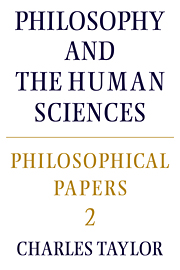Book contents
2 - Neutrality in political science
Published online by Cambridge University Press: 05 June 2012
Summary
A few years ago one heard it frequently said that political philosophy was dead, that it had been killed by the growth of science, the growth of positivism, the end of ideology, or some combination of these forces, but that, whatever the cause, it was dead.
It is not my intention to rake over the coals of this old issue once more. I am simply using this as a starting point for a reflection on the relation between political science and political philosophy. For behind the view that political philosophy was dead, behind any view which holds that it can die, lies the belief that its fate can be separated from that of political science; for no one would claim that the science of politics is dead, however one might disapprove of this or that manner of carrying it on. It remains a perpetually possible, and indeed important enterprise.
The view was indeed that political science has come of age in freeing itself finally of the incubus of political philosophy. No more would its scope be narrowed and its work prejudiced by some value position which operated as an initial weight holding back the whole enterprise. The belief was that political science had freed itself from philosophy in becoming value-free and in adopting the scientific method. These two moves were felt to be closely connected; indeed, the second contains the first. For scientific method is, if nothing else, a dispassionate study of the facts as they are, without metaphysical presuppositions, and without value biasses.
- Type
- Chapter
- Information
- Philosophical Papers , pp. 58 - 90Publisher: Cambridge University PressPrint publication year: 1985
- 30
- Cited by



